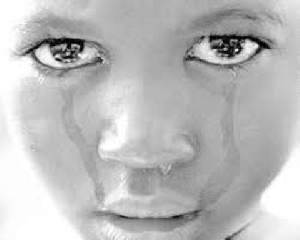 There are several reported cases of child abuse in the country
There are several reported cases of child abuse in the country
Madam Florence Ayisi Quartey, Acting Director, Department of Children at the Ministry of Gender, Children and Social Protection, said Ghana would from next year have a one-stop Centre for the handling of child abuse cases and general child protection issues.
She said the Centre would serve as an umbrella for children and families subjected to abuse and also provide essential and specialized services such as health care, counselling, collection of forensic evidence, criminal investigation, referral and psychological support to them.
Madam Quartey said this at a stakeholder’s technical workshop, organized by the Ministry of Gender, Children and Social Protection with support from World Future Council, which discussed how to establish the Centre to enhance child protection system in the country.
The Director said the facility would have units for the Department of Social Welfare, Domestic Violence and Victim Support Unit (DOVVSU) and the Ghana Health Service for effective coordination.
She said the idea was to make reporting of child abuse cases much easier for survivors and their families thereby “providing an enabling environment for them to thrive."
Madam Quartey said the new approach was expected to ensure effective implementation of the child protection system as stipulated in the Child and Family Welfare Policy of 2015.
“The vision is that all the District Hospitals will have the facility to support the victims, and we hope that by the end of the first quarter of next year, we will have all the modalities in place to start the actual implementation of the programme," she said.
Madam Quartey said the country had strengthened its child protection policy framework with the development of the Child and Family Welfare Policy and Justice for Children Policy, adding that government had also taken a step to amend all child related legislations to promote and protect the rights of children and the vulnerable groups according to international and human rights standards.
She said in order to increase awareness and prosecute cases of abuse, it was imperative to take services to the doorstep of the people for timely intervention, hence the need for the Centre.
Madam Quartey noted regrettably that many survivors of child violence and abuse received little support in the area of medical, psychological and legal services, adding, “in cases where these services are available, they are mostly offered separately with no effective coordination or timely investigation, which most of the time leads to poor or no prosecution of perpetrators".
She said about 21. 8 per cent of children in the country suffered from child labour, while 3.8 per cent suffered dangers of Female Genital Mutilation (FGM) and 18 per cent sexually abused.
Madam Samia Kassid, Senior Project Manager, The Right of Children at the World Future Council in Germany, said Ghana's quest for the one-stop Centre model required a strong political will for effective implementation. The one-stop Centre model originates from Malaysia and now operational in many countries in South Asia and Africa.
The Centre is usually located in a health facility, especially at the emergency centre or in some cases, be a stand - alone facility within or near a collaborating hospital and provides multi sectoral case management for survivors.